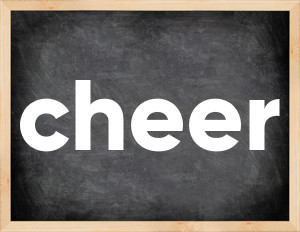 The English verb 'cheer' is pronounced as [tʃɪr].
The English verb 'cheer' is pronounced as [tʃɪr].
Related to:
regular verbs.
3 forms of verb cheer: Infinitive (cheer), Past Simple - (cheered), Past Participle - (cheered).
Here are the past tense forms of the verb cheer
👉 Forms of verb cheer in future and past simple and past participle.
❓ What is the past tense of cheer.
Cheer: Past, Present, and Participle Forms
| Base Form | Past Simple | Past Participle |
|---|---|---|
| cheer [tʃɪr] |
cheered [tʃɪəd] |
cheered [tʃɪəd] |
What are the 2nd and 3rd forms of the verb cheer?
🎓 What are the past simple, future simple, present perfect, past perfect, and future perfect forms of the base form (infinitive) 'cheer'?
Learn the three forms of the English verb 'cheer'
- the first form (V1) is 'cheer' used in present simple and future simple tenses.
- the second form (V2) is 'cheered' used in past simple tense.
- the third form (V3) is 'cheered' used in present perfect and past perfect tenses.
What are the past tense and past participle of cheer?
The past tense and past participle of cheer are: cheer in past simple is cheered, and past participle is cheered.
What is the past tense of cheer?
The past tense of the verb "cheer" is "cheered", and the past participle is "cheered".
Verb Tenses
Past simple — cheer in past simple cheered
(V2).
Future simple — cheer in future simple is cheer (will + V1).
Present Perfect — cheer in present perfect tense is
cheered
(have/has + V3).
Past Perfect — cheer in past perfect tense is
cheered
(had + V3).
cheer regular or irregular verb?
👉 Is 'cheer' a regular or irregular verb? The verb 'cheer' is regular verb.
Examples of Verb cheer in Sentences
- Sorry, we can't come to cheer for you, Johnny. (Present Simple)
- Everyone cheered when our dachshunds and bulldogs were found. (Past Simple)
- The whole town cheered the team when they won. (Past Simple)
- Steve cheered him, and that helped. (Past Simple)
- Does my letter cheer you up? (Present Simple)
- The audience clapped and cheered after the play. (Past Simple)
- The spectators are cheering him wildly. (Present Continuous)
- Supporters have cheered the court's decision. (Present Perfect)
- We cheered the rise of the hot-air balloon. (Past Simple)
- The crowd was cheering as the ship drew slowly away. (Past Continuous)